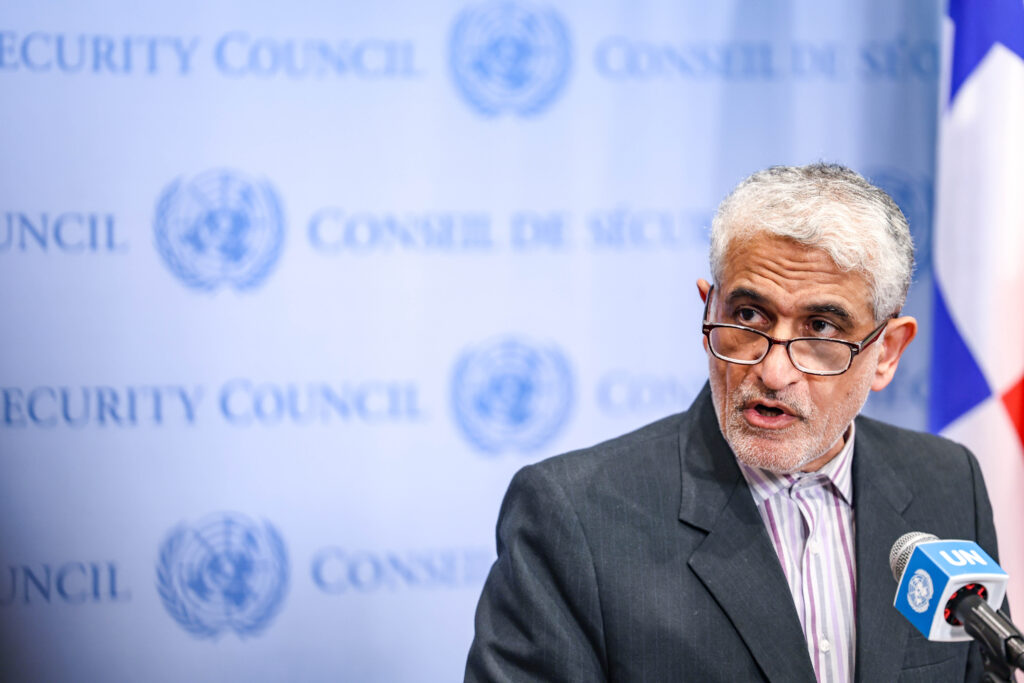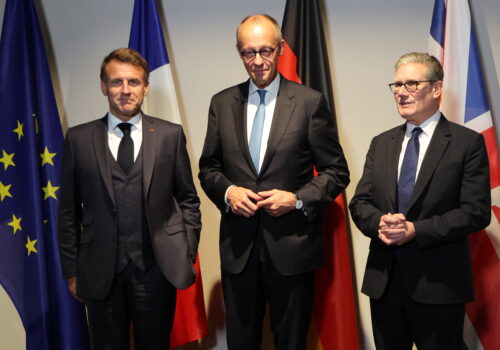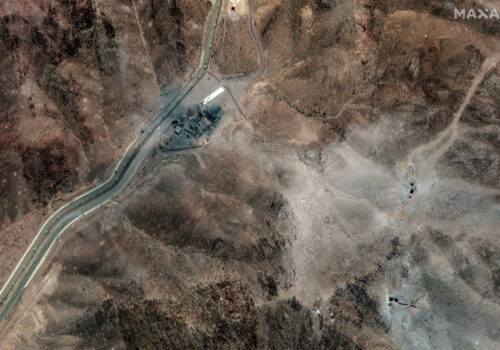Pity the “E3” grouping of Britain, France, and Germany. As the European parties to the 2015 Joint Comprehensive Plan of Action (JCPOA), they have found themselves forced to pull the infamous “snapback” lever to restore United Nations (UN) sanctions on Iran. It will take effect at the end of this month, unless an unlikely last-minute concession by Iran can create space for a postponement in the Security Council. This is not where policymakers in London, Paris, or Berlin ever wanted to be, but with time running out before their option to “snap back” expires, they have been left with little choice.
That is because allowing the provision to expire would remove Iran’s nuclear program from the Security Council’s agenda, effectively declaring that there are no international concerns about its potential military uses. That would be perverse. Despite the damage inflicted by the Israeli and US bombing of Iran and Iran’s nuclear facilities in June, the whereabouts of Tehran’s stockpile of Highly Enriched Uranium is not known, and there is no meaningful access for the International Atomic Energy Agency (IAEA) inspectors into the key sites.
So assuming the snapback happens, UN member states will once more be under the obligation to enforce sanctions, including an arms embargo, on Iran. In practice, that may cause little additional harm to Iran’s economy, already squeezed by US maximum pressure sanctions. But the political impact will probably be to make any negotiated agreement an even more remote prospect. Iran has threatened to retaliate, including possibly by leaving the Nuclear Non-Proliferation Treaty.
The irony of this is that for the international community, now would be the best time to negotiate a new, lasting deal with Iran. Instead, snapback sanctions threaten to take us into further sterile confrontation. The Iranian regime is deeply divided about future strategy, but this will make life harder for those who want to argue for talks and concessions in return for relief from sanctions. On the other side, the US administration does not seem keen to engage in the sort of patient, detailed deal-making that would be necessary, instead staking out maximalist positions amounting to the sort of capitulation that Tehran is unlikely to consider. The prospect for renewed negotiations looks bleak.
SIGN UP FOR THIS WEEK IN THE MIDEAST NEWSLETTER
Does that matter? Iran is severely weakened by the decimation of its air defenses as well as its nuclear sites as part of the Twelve-Day War this summer. The “front of resistance” representing Iran’s forward-defense is similarly degraded in Syria, Lebanon, and Gaza. So, why should we worry if Iran can’t be brought back to the nuclear negotiating table?
Such thinking represents a dangerous triumphalism. The truth is that there have only ever been two ways to deal with the threat of the Islamic Republic’s nuclear enrichment: by binding agreements putting it beyond the capacity to cause harm, or by ongoing military action. A single attack, however effective, does not prevent Iran from rebuilding: the military route commits the United States to backing Israel in the sort of “forever war” that US President Donald Trump came to office committing to avoid.
Iran, of course, is incensed by the activation of the snapback clause. From their point of view, they were in full compliance with the JCPOA when the United States walked out in 2018: they don’t accept that the E3 have the right to take this step. It’s true that when the first Trump administration came to power in 2017, Iran’s program was contained, and by the end of his first term, it was out of control—further ramping up in response to every new measure taken against it.
Snapping back sanctions not only amounts to a final admission of the failure of the JCPOA, but it will also increase friction in the Security Council. Russia and China will take Iran’s side. But there is little point in rehearsing how the JCPOA parties ended up here: the legality of snapback is fairly open-and-shut. The key is what happens next.
Hawks will claim that the West may be saved from this dilemma of negotiations versus repeated bombing: the regime may be overthrown, and a new dispensation in Tehran might give up its nuclear enrichment and ballistic missile programmes, and support for regional proxies. But that amounts to policy-making by wishful thinking. The regime knows it has run out of legitimacy and popular support, as evidenced by an unprecedented level of challenge to the Supreme Leader’s hardline ideology from voices inside the regime. But a convulsive change would likely result either in the Islamic Revolutionary Guard Corps (IRGC) stepping in to take control, or sliding towards internal conflict and state collapse. The scale of regional crisis if Iran were to slip into the same sort of civil war as Syria or Libya stretches the imagination.
So, when the dust settles, the West will probably be left facing the recognition that the least bad option is the painstaking process of negotiating a new deal of some sort, one that permanently puts to rest the threat of a military nuclear program, in return for sanctions relief. Unlike in 2015, these talks would have to address, in some form, Iran’s regional behaviour and involve regional players.
This is incredibly hard, but one of the hardest things about it may be the ideology that has taken root among hawkish commentators, that any concession on sanctions is automatically a bad thing. This is a mistake. Economic pressure is important, and should only be relieved in return for hard security gains. But one reason Iranian securocrats hated the JCPOA so much was that they could see that sanctions relief weakened their grip. By contrast, the sanctions of recent years have allowed the IRGC to extend control over much of the Iranian economy. It’s in the interests of the West and the Iranian people to keep alive the possibility of a negotiated solution that eventually helps Iran become a more normal country.
Rob Macaire is a member of the Atlantic Council’s Iran Strategy Project advisory committee and a former British ambassador to Iran.
Further reading
Thu, Aug 28, 2025
Will European pressure bring Iran back to the table for nuclear talks?
Fast Thinking By
Germany, France, and the United Kingdom are threatening economic measures against Iran to pressure it into rejoining talks aimed at placing limits on its nuclear program.
Thu, Jun 26, 2025
What really happened to Fordow? Three possible futures for Iran’s nuclear program after US strikes.
New Atlanticist By Amir Asmar
The condition of Fordow will have a direct impact on the likelihood of Iran giving up its nuclear program versus resuming its pursuit of nuclear weapons.
Sat, Jun 14, 2025
Israel’s Iran strike provides a historic chance for Middle East realignment
Inflection Points By Frederick Kempe
History will remember this moment less for the Israeli strikes themselves and more for what follows.
Image: August 29, 2025, New York, New York, USA: AMIR SAEID IRAVANI, Permanent Representative of Iran to the United Nations, speaks to reporters at the Security Council stakeout in New York regarding the E3 move to trigger the snapback process under Resolution 2231. (Credit Image: © Bianca Otero/ZUMA Press Wire)




